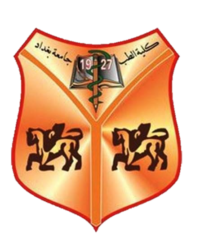Curriculum Description
This course description provides a necessary summary of the most important characteristics of the course and the expected learning outcomes for the student to achieve evidence of whether he made the most of the available learning opportunities. It must be linked to a description of the program.
General Description
| Category | Details |
|---|---|
| Name of Organization: | Baghdad College of Medicine |
| Department: | Medical Education Unit |
| Module Name: | English Language |
| Course Pattern: | Large group lectures and small group lectures |
| Semester and Year: | 1st Year / Semester 2 |
| Total Course Hours: | 30 |
Goal of the Course
- Study the beginner level of the English language.
- The ability to explain texts.
- Developing the student's speaking skill by proposing different topics.
- Development of the skill of listening. Presenting slow and fast conversations for the purpose of gradually developing the skill of listening.
- Development of writing skills by writing various stories and topics that enable the student to discover the advanced level of grammar and linking sentences.
- Development of the skill of reading through knowledge of its types and methods.
Outcome of this Module
A. Cognitive and Theoretical Goals:
- Understanding and applying the beginner level of the English language.
- Applying the beginner level of speaking skill by talking to larger groups of students.
- To develop the skill of listening through conversations with native English speakers.
- The ability to develop writing at a beginner level through various uses of tenses and grammar.
- Increasing self-confidence and not being afraid of mistakes but rather correcting them and learning better.
B. Skills:
- Correct use of advanced level of English grammar.
- Acquire the skill of speaking in front of a larger number of students.
- Understand the questions of listening skill through specific timing.
- Correct use of grammar rules during writing skill.
- Know how to read the required texts and summarize them in a scientific way.
Methods of Learning
- Large group lectures.
- Small group lectures.
- Interactive participation in the designated website by giving lectures and conducting multiple tests.
Methods of Assessment
- Theoretical test with multiple questions.
- A theoretical test with various written questions to test the skill of writing and expression.
- Interactive tests on the website.
C. Values and Sentimental Goals:
- Gaining confidence through scientific discussions in front of large numbers of other students.
- Importance of respecting time and accomplishing tasks within time limits.
- Team-based learning.
- Using self-stimulation for the purpose of enhancing the English language for a better scientific level.
D. General and Qualifying Skills (Other Skills Related to Employability and Personal Development):
- Fluency in using the English language through the four skills: speaking, listening, reading, and writing.
- Proficiency in the use of grammar rules for the advanced level.
- Contributing to academic activities whose main language is English.
- Developing the student’s skills by focusing on some external influences that help in developing himself.
Infrastructure
- One week for the beginner level of the English language.
- One week for grammar + text analysis.
- One week for reading skill.
- One week for speaking skill.
- One week for listening skill.
- One week for grammar + writing skill.
- One week for vocabularies.
- Each week contains 2-hour lectures. Assessment done by the homework and the final written exam.
Course Books Required
- New Headway Plus for Beginners, Fourth Edition (John and Liz Soars) Oxford.
Main References (Sources)
- Grammar in Use.
Recommended Resources
- The Cambridge Encyclopedia of the English Language.
Electronic References
- BBC News: https://iraq.britishcouncil.org/en
Course Development Plan
- The use of information technology, through the use of a group of educational websites, which help in developing English language skills.
- Using a group of books specialized in teaching the English language.
- Access to recent research, articles, and studies related to modern learning methods.

